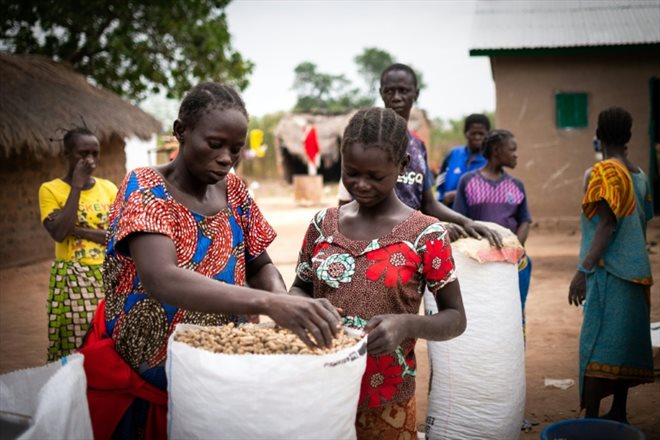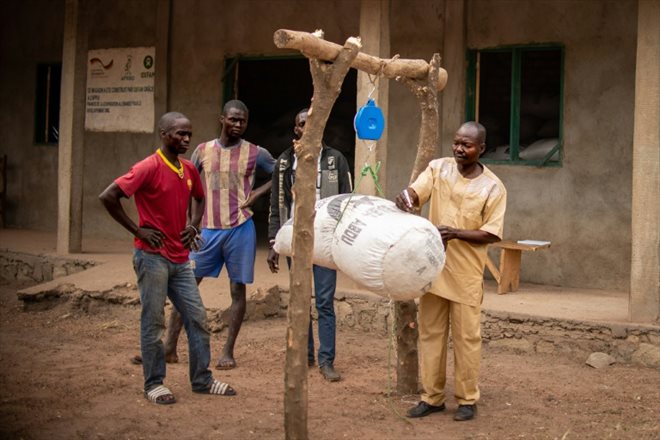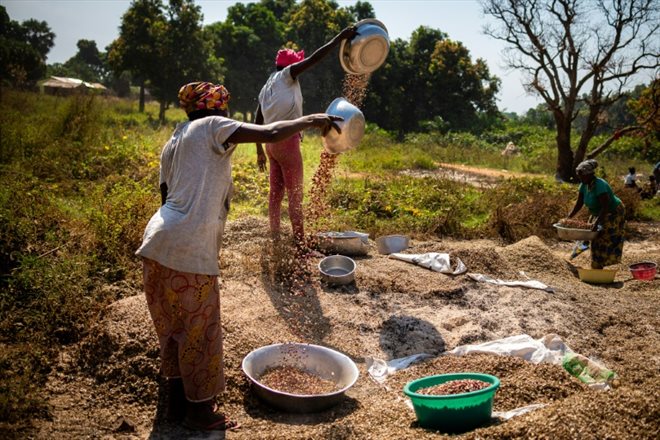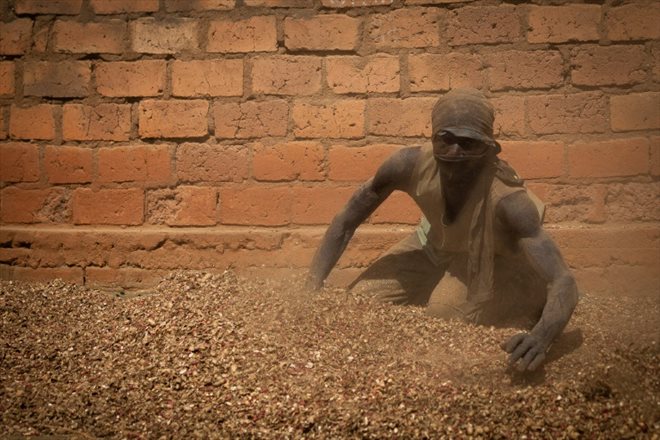A woman sorts peanuts in Paoua, in the northwest of the Central African Republic, on December 1, 2021 (AFP / Barbara DEBOUT)
With her back bent in the heat, Marissa separates peanut seeds from their shells. In the north-west of the Central African Republic, the cultivation of legumes represents an outlet for the population, but the fighting between rebels and pro-government forces is hampering the development of the sector.
Marissa, covered in dust and her eyes weary from repeating the same gestures, fills bags of peanuts in Paoua, a town located 500 km northwest of the capital Bangui.
Like the majority of the inhabitants of the locality, the young woman depends for her survival on the cultivation of peanuts, but the regular attacks of the armed groups – in particular those of the 3R (Return, Claim, Rehabilitation), one of the most powerful – have prevented to export the goods.

Célestine Inforo, a farmer, packs her peanuts in bags in Paoua, in the north-west of the Central African Republic, on December 1, 2021 (AFP / Barbara DEBOUT)
“There are too many threats and thefts,” complains Célestine Inforo, a 33-year-old farmer. “We had to sell the production very quickly and at a low price.” In the suburb of Paoua, the farmer, surrounded by a dozen people, removes the husks from the peanuts. The seeds, placed in basins, are thrown into the air to remove the thin film that surrounds it.
In a few hours, Célestine Inforo filled several bags. A team of two oxen takes the production to a secure storage space loaned by Oxfam, an NGO which supports the sector in this region.
– “Coupeurs de route” –
In front of the hangar, each bag is weighed. Their weight varies between 35 and 45 kg. In the city, they are sold for around 10,000 CFA francs, around 15 euros, a far cry from the prices in Bangui.

Men weigh a bag of peanuts in Paoua, in the northwest of the Central African Republic, on December 1, 2021 (AFP / Barbara DEBOUT)
“In the capital, prices are between 20,000 and 30,000 CFA francs” for a bag of shelled peanuts, says Jean-Paul Ndopaye, president of the Paoua Rice Farmers Union, which also includes local peanut producers.
“We have the stock, but selling in Bangui means exposing yourself to coupeurs de route,” he continues.
Production far exceeds demand in the region, resulting in falling prices. A dramatic situation in a town of some 47,000 inhabitants when “80% of the population of Paoua has an activity related to peanuts”, argues Noël Zingani, head of the Oxfam office. Low prices affect the entire industry in Paoua. Marissa barely earns 250 CFA francs, less than 40 euro cents, for each bag she fills.

Women sort peanuts in Paoua, in the northeast of the Central African Republic, on December 1, 2021 (AFP / Barbara DEBOUT)
For several months, the armed groups that have raged in the Central African Republic, pushed back from large towns, have resorted to guerrilla techniques and planted explosive devices along the main roads to delay the advance of pro-government forces.
The Central African Republic is one of the poorest countries in the world, in the grip of a civil war since 2013 which has, however, diminished in intensity in recent years. The conflict rekindled, however, in the last presidential election a year ago.
In Ouham-Pendé, of which Paoua is the prefecture, the World Food Program (WFP) estimates that the malnutrition affecting this region is unprecedented: “61% of the population is in phase 3 of crisis and in phase 4 of food emergency “, according to Mahoua Coulibaly, local manager of the UN agency.
– Transformation –
Under overwhelming heat, Marie roasts peanuts. For an hour, she stirs the seeds while taking care not to burn herself. In the courtyard of this concession sheltered by a mango tree, three women transform peanuts every day into oil, paste and “kuli-kuli”, sticks with a high nutritional content, thanks to the proteins and fibers of the legume.

A man shells peanuts in Paoua, in the northwest of the Central African Republic, on December 1, 2021 (AFP / Barbara DEBOUT)
Lena, kneeling beside Marie, kneads the peanut paste on a wooden board. “Extracting oil with this method is physically exhausting, it can take hours,” explains Moussa Issoufou, Oxfam’s food security manager. “We must find modern equipment to facilitate their work,” he continues, believing that this is the only way for these women to sell the products more expensive.
“What poses a problem is the transformation, it is what must be invested in for the well-being of the population but for the moment the funds are lacking”, deplores Mr. Coulibaly.
© 2022 AFP
Did you like this article ? Share it with your friends with the buttons below.




